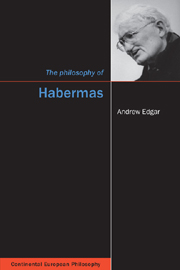1 - The Marxist heritage
Summary
Introduction
Habermas's creativity, alongside the breadth and contemporary relevance of his work, was already evident by the end of the 1960s. Between 1953, when he wrote his first significant academic article (reviewing Heidegger's Introduction to Metaphysics), and 1970, when the second edition of The Logic of the Social Sciences was published, Habermas matured from a student of what he has himself called a narrowly German philosophy (AS: 80) to the acknowledged inheritor of the Frankfurt tradition of Western Marxism, which is to say, of German critical theory. By 1970 his work was based as profoundly upon an engagement with Anglo-Saxon analytic philosophy, American pragmatism and American and European sociology as it was with the more German traditions of Marxism, psychoanalysis and hermeneutics. Recognizing the strengths of earlier generations of Marxist theorists, while attempting to correct such perceived weaknesses as their understanding of political practice and over-reliance on Hegelian dialectics, Habermas sought to develop a renewed critical theory that would be appropriate to the unique problems and opportunities of late-twentieth-century capitalism. This theory would, in turn, be entwined with his substantive commentaries on the condition of liberal democracy, social policy and the welfare state, on science and technology, and on education. That this period marked no more than the first stage of Habermas's intellectual development, for he was only just beginning to articulate the theory of communicative action that would become the bedrock of his work throughout the next 30 years, is but further testimony to the dynamic and self-critical character of his thought.
- Type
- Chapter
- Information
- The Philosophy of Habermas , pp. 1 - 26Publisher: Acumen PublishingPrint publication year: 2005



